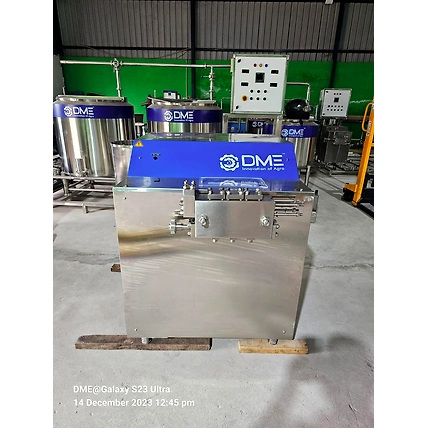HOMOGENIZER 2000
Price upon request-
Product is not available
Homogenizer Applications: A Versatile Tool Across Industries
Homogenizers are essential pieces of equipment used to break down particles into smaller, more uniform sizes.
They are widely employed in various industries to create consistent and high-quality products.
Key Applications of Homogenizers
Food and Beverage Industry:
Dairy Products: Homogenizers are used to prevent the separation of cream in milk, ensuring a smooth and consistent texture.
Sauces and Dressings: They help create emulsified mixtures, such as mayonnaise and salad dressing Dispersion: They help disperse pigments and other ingredients in cosmetics.
Biotechnology:
Cell Disruption: Homogenizers are used to disrupt cells and extract their contents for analysis.
Tissue Homogenization: They help prepare tissue samples for various biological experiments.
Chemical Industry:
Emulsions: Homogenizers are used to create emulsions in various chemical processes.
Particle Dispersion: They help disperse pigments and other additives in paints, inks, and other chemical products.
-
Additional Information
Homogenizer Applications: A Versatile Tool Across Industries
Homogenizers are essential pieces of equipment used to break down particles into smaller, more uniform sizes.
They are widely employed in various industries to create consistent and high-quality products.
Key Applications of Homogenizers
Food and Beverage Industry:
Dairy Products: Homogenizers are used to prevent the separation of cream in milk, ensuring a smooth and consistent texture.
Sauces and Dressings: They help create emulsified mixtures, such as mayonnaise and salad dressings.
Beverages: Homogenizers are used in the production of fruit juices, smoothies, and other blended drinks.
Pharmaceutical Industry:
Drug Development: Homogenizers are employed to prepare and analyze drug formulations.
Nanoencapsulation: They are used to create nanoparticles for drug delivery systems.
Particle Size Reduction: Homogenizers help reduce the size of particles in pharmaceutical ingredients.
Cosmetic Industry:
Emulsions: Homogenizers are used to create stable emulsions of oil and water in products like creams, lotions, and makeup.
Particle Dispersion: They help disperse pigments and other ingredients in cosmetics.
Biotechnology:
Cell Disruption: Homogenizers are used to disrupt cells and extract their contents for analysis.
Tissue Homogenization: They help prepare tissue samples for various biological experiments.
Chemical Industry:
Emulsions: Homogenizers are used to create emulsions in various chemical processes.
Particle Dispersion: They help disperse pigments and other additives in paints, inks, and other chemical products.
Environmental Science:
Sample Preparation: Homogenizers are used to prepare environmental samples for analysis, such as soil, water, and biological materials.
Types of Homogenizers
Rotor-Stator Homogenizers: These use a rotating rotor and a stationary stator to create shear forces and break down particles.
High-Pressure Homogenizers: These force materials through a narrow orifice at high pressure, causing mechanical disruption.
Ultrasonic Homogenizers: These use ultrasonic waves to create cavitation, which breaks down particles.
Bead Mills: These use grinding beads to disrupt particles through mechanical action.
In conclusion, homogenizers are versatile tools with a wide range of applications across various industries. They play a crucial role in creating consistent, high-quality products and are essential for many manufacturing processes.
-
Reviews ()



